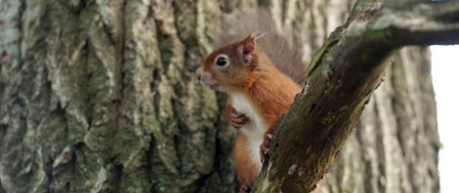Monday 9th May 2016, 11:30am
Wildlife experts have launched a project to better understand how British red squirrels are affected by a form of leprosy.
The study will investigate how the disease is passed between squirrels and how conservationists can help control its spread. Vets will use humane traps to capture the squirrels for health checks. They will take blood samples and other clinical samples for analysis before returning the animals to the wild.
"The aim of our study is to find out how and why red squirrels catch leprosy, and how it affects both individuals and populations."
Professor Anna Meredith, Royal (Dick) School of Veterinary Studies
Researchers from the Royal (Dick) School of Veterinary Studies are working with the National Trust and Dorset Wildlife Trust on the project.
The research will take place on Brownsea Island, in Poole Harbour, Dorset, which is home to around 200 red squirrels.
Leprosy was first identified in red squirrels in Scotland in 2014, although the disease is believed to have been present in the squirrel population for centuries.Post-mortems have since revealed that the disease is also affecting squirrels on the Isle of Wight and Brownsea Island, off the south coast of England. The risk to people from the disease is very low.
"Leprosy appears to have been in squirrel populations in Scotland and Englandís south coast for some time. With this research, we aim to help conservationists better understand and manage the disease in this iconic species."
Professor Anna Meredith, Royal (Dick) School of Veterinary StudiesThe island location allows researchers to study the impact of leprosy in a contained environment.Bacterial infectionThe disease is believed to have been present on Brownsea for many years but researchers have only recently diagnosed it as leprosy.
Little is known about how the bacteria is spreading among red squirrels. The disease causes swelling and hair loss to the ears, muzzle and feet.Endangered animalsRed squirrels have drastically declined in the UK with fewer than 140,000 thought to be remaining on our shores.
The main threat to their numbers is from habitat loss and the squirrelpox virus, which is deadly to red squirrels.